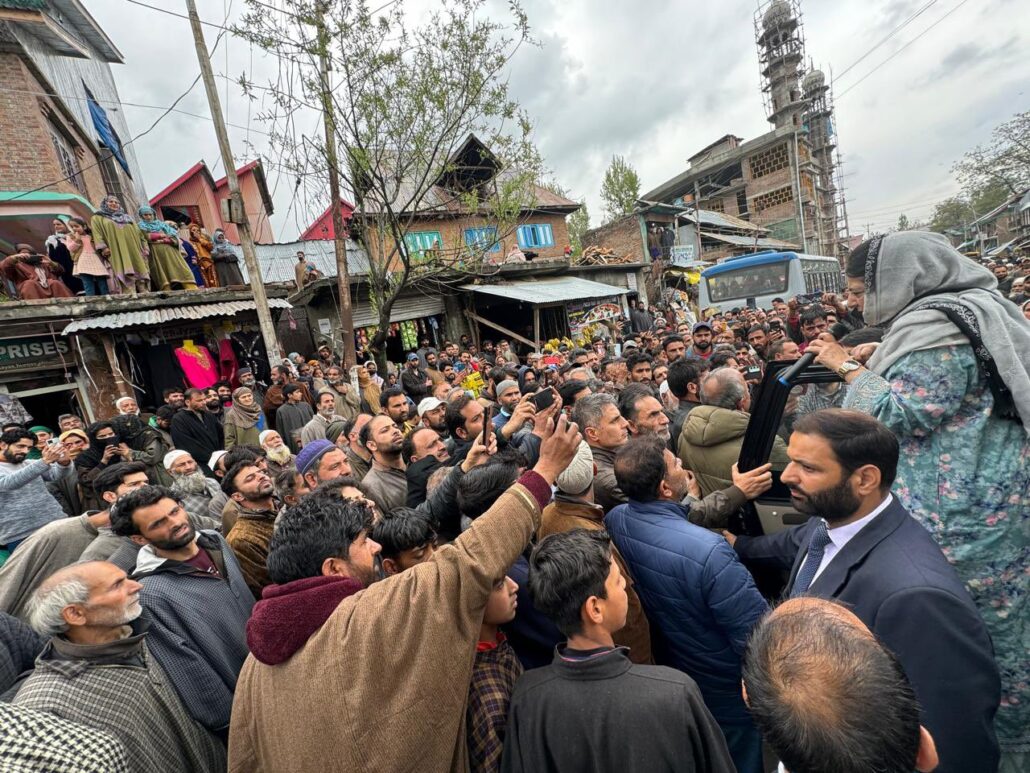
Bhat Yasir
Arif Amin, (named changed), holding a red flag, with Sheikh Abdullah’s image on it is participating in a rally of Jammu Kashmir National Conference (NC) in Kulgam district of south Kashmir. “I have never supported any political party. But this time it is important for us to actively engage and participate in the electoral process,” said Arif, while marching ahead to click selfies with Omar Abdullah , the NC vice president.
Arif is one of the hundreds of Kashmiri youth who had been arrested in the yesteryears in connection with anti national activities, but many like the 24-year-old are showing an increased interest for the first time.
“This election is not merely about casting our votes, but also an expression of anger against the policies of the present dispensation,” Aga Ruhullah Mehdi, the National conference candidate from Srinagar said in a conversation with The Kashmiriyat.
Today banners of almost all political parties have been erected across the belt, Damhal Hanjipora, venue of Omar Abdullah’s rally. This was once home to more than a dozen militants who joined militancy in Kashmir post 2016.
Several militant commanders also hailed from the region, which witnessed a massive shift after 2016. This belt in Kulgam district is a witnesses to the tectonic shifts Kashmir’s political landscape has undergone.
Wali Mohammad Itoo, a veteran NC leader and former Speaker of the Jammu Kashmir assembly hailed from here.
Tragically, Itoo was assassinated by militants at point-blank range on March 18, 1994.
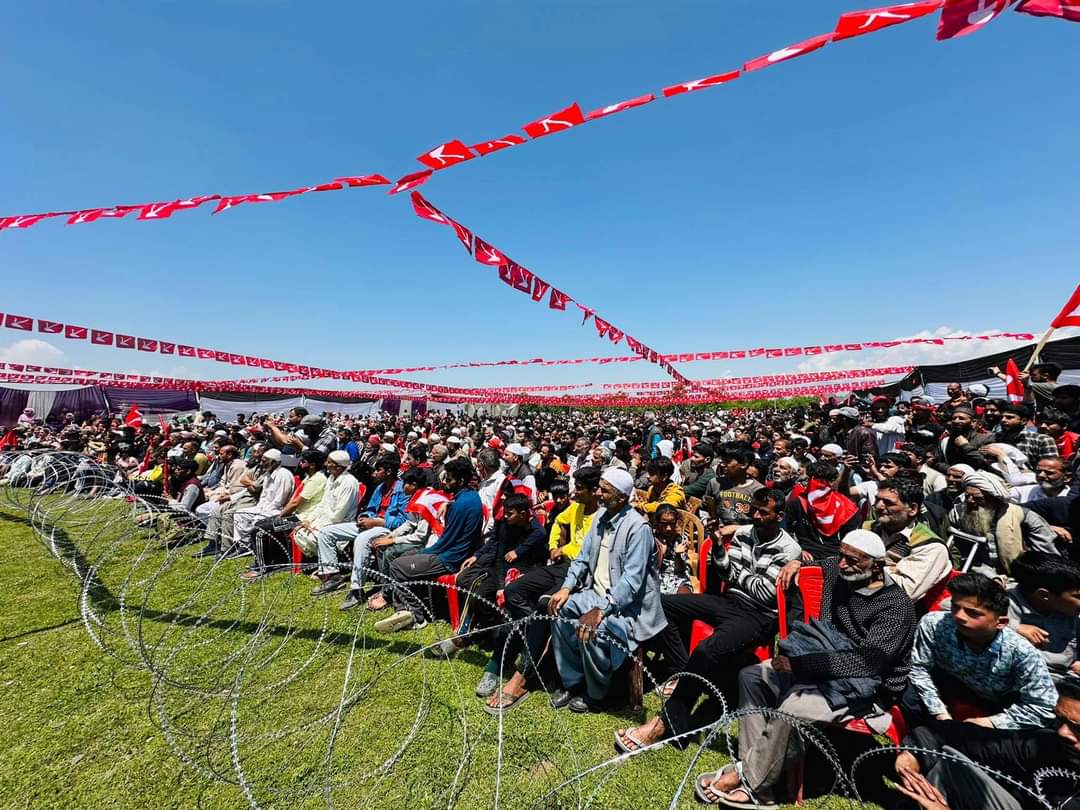
NC’s strong leader, Sakina Itoo, who was studying medicine at the time of her father’s death heeded to Farooq Abdullah’s encouragement to enter politics and contested the Noorabad seat in 1996.
Despite surviving six assassination attempts during her 2002 campaign, Sakina holds a massive support here. “There is massive enthusiasm, I think this enthusiasm among people is a result of the disempowerment of people. There has been no functional assembly since 2019. People await the time when they can elect their representatives to the assembly,” Sakeena itoo told The Kashmiriyat.
In 2018, Bhartiya Janta Party withdrew support from their coalition partners; the People’s Democratic Party and since then there has been no functional assembly in the region. More than a year after the decision, the central government abrogated Articles 370 and 35A that granted special status to Jammu Kashmir.
Among the many persons detained were there former chief ministers; Omar Abdullah, Mehbooba Mufti and Farooq Abdullah and dozens of their legislators.
Kashmir was put under a curfew and communication was snapped to prevent any law and order situation, the central government said. The decision of abrogation was challenged by several political parties including JKPDP, JKNC, PC among others, however, the court ruled in favour of the regions of August 5, 2019.
Mohammed Amin, 72, an old aged voter is voting for the first time since 1987, he says. “In 1987, we participated in elections out of conviction; this time, it’s obligatory, we have no choice,” he stated, walking behind a PDP cavalcade in Pulwama Pinglan area.
Kashmir’s Electoral Crossroads
The year 1987 marked a pivotal moment in Kashmiri politics. The formation of the Muslim United Front (MUF), a coalition of socio-religious groups in the Kashmir valley, presented a formidable challenge to the ruling National Conference-Congress alliance.
Enjoying widespread public support, the MUF aimed to combat corruption and misgovernance, and improve the financial well-being of Kashmiri Muslims.
However, the MUF’s aspirations were thwarted through dubious means. In several constituencies, election manipulation and violence marred the electoral process.
Polling agents of the MUF were detained and subjected to public beatings, not only by law enforcement but also by rival candidates. Prominent MUF candidates and supporters faced detention, torture, and arbitrary arrests under the Public Safety Act.
This period of political repression and electoral fraud became a catalyst for the emergence of militancy in Kashmir.
Several young men, disillusioned by the rigged elections and state-sponsored violence, turned to militancy.
Among them was Mohammad Yousuf Shah, who contested the Amira Kadal constituency but fled Kashmir to evade torture. Today, Shah leads the United Jihad Council, an umbrella organization of militant groups operating in Kashmir.
The events of 1987 led to deep-seated grievances and frustrations within Kashmiri society, fueling decades of conflict and unrest in the region.
Among the many candidates in fray for the 18th Lok Sabha elections is the People’s Democratic Party’s youth leader Waheed u Rehman Parra. In his speeches, Parra is seeking votes for the “restoration of the dignity, identity and rights.”
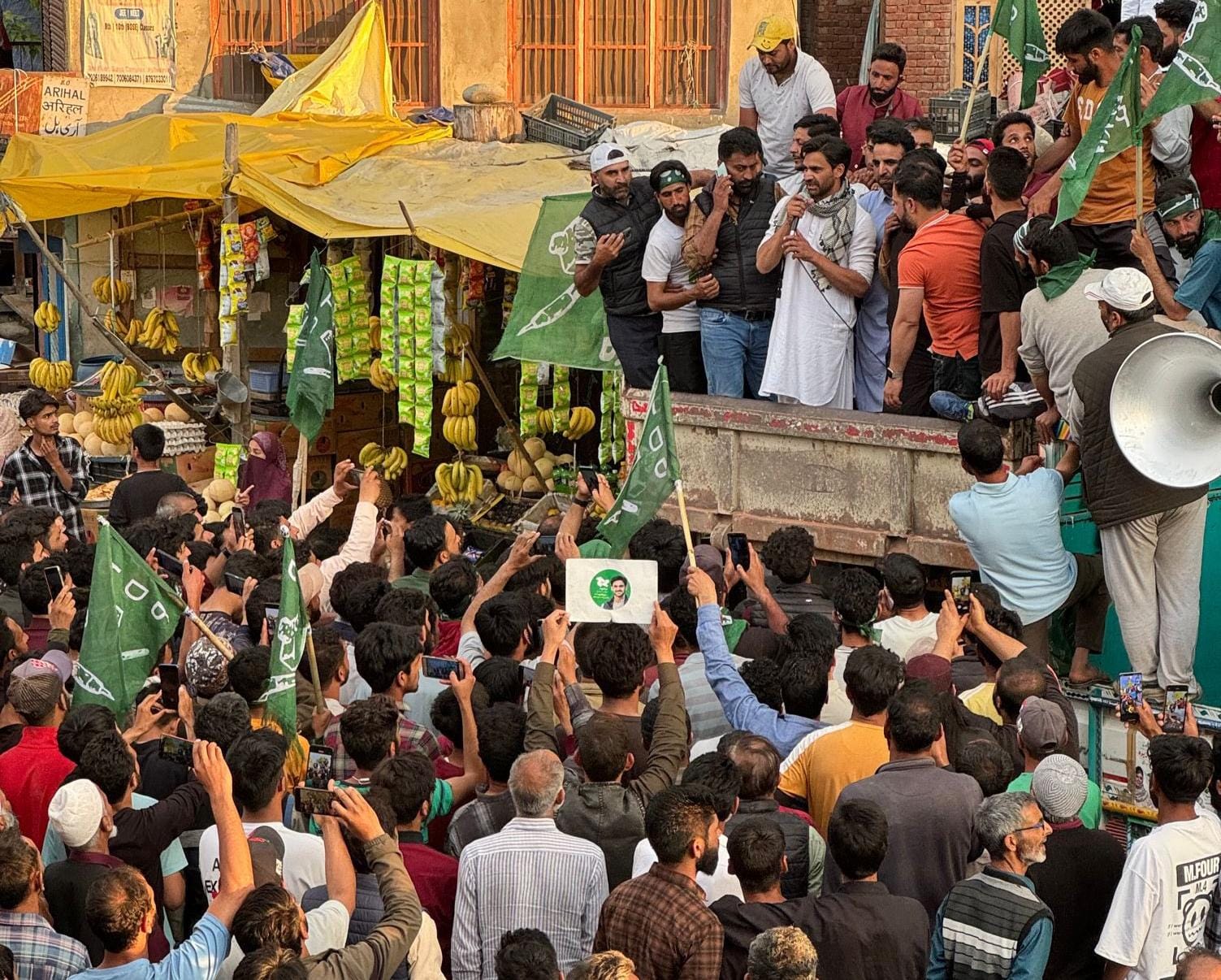
Like Mehbooba Mufti, he, too marches, in the villages of Pulwama district, once considered to be a hot-bed of militancy. The People’s Democratic Party is battling for survival, as most of its leaders have quit the party.
The resurgence in political engagement comes amidst significant changes, including the abrogation of Article 370 and the subsequent delimitation process prompting many to view the poll process as an opportunity to express their sentiments towards the BJP government and its policies.
The absence of boycott calls, partly due to the incarceration of most of the separatist leaders, has increased celebration of the electoral process, albeit with lingering skepticism among major segments of the population, however, the BJP which might want to take credit of this has stayed away from the elections in the valley.
“We have brought development and peace to the valley by abrogating the special status of the region (Article 370) and the people of the valley are happy,” the Indian prime minister, Narendra Modi told crowds in Gujarat, thousands of miles away from Kashmir.
The crowds cheered to PM Modi’s Kashmir mention, however, the party has not named any candidates for the litmus test for that claim in the three lok Sabha seats in the region. This move comes as a surprise, as it marks the first time since 1996 that the BJP has opted not to contest a general election in the region.
Traditionally, the party has had limited support here, but experts note a recent increase in its cadre base.
The BJP’s most notable performance was in the 2014 state elections, where it emerged as the second-largest party, securing 25 out of the total 87 seats, all in Jammu.
“They (people) all go to their functions for small gains, but when it’s the time to vote, they (BJP) will not get even a single vote in the valley,” Sakeena Itoo said, in a conversation with The Kashmiriyat.
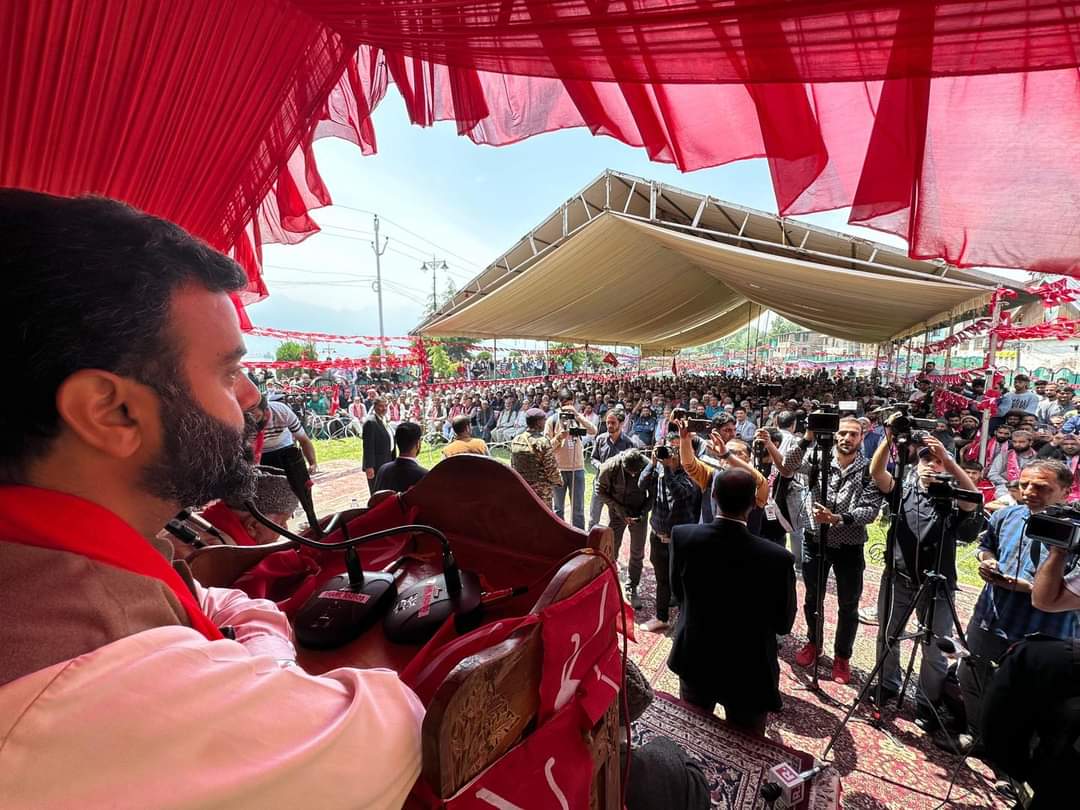
In absense of the Bhartiya Janta Party, the region’s two main parties People’s Democratic Party and the National Conference will face a heated contest in Anantnag Rajouri and the Srinagar Lok Sabha seats. While North Kashmir’s Baramulla seat is geared for a hot battle between Sajad Gani Lone of People’s conference and Omar Abdullah.
Both the candidates have been calling eachother for their “close-ties” with the ruling Bhartiya Janta Party amid the festive mood in the region, which is witnessing massive political rallies after several decades.
Voter Enthusiasm
In the past few years, the government has often cited security concerns as a primary reason for not holding assembly polls in the valley. However, this time, elaborate arrangements have been made to facilitate the electoral process despite these challenges.
The security situation in the Kashmir Valley ahead of the Lok Sabha elections remains a top priority for authorities, officials said.
Government forces have conducted flag marches across various districts, including Ganderbal, Baramulla, Pulwama, Kulgam, Sopore, Shopian, Bandipora, and Budgam, to instill a sense of security and confidence among voters.
These marches, part of an area domination exercise, involve the participation of senior officers and jawans from the district police and Central Armed Police Forces (CAPF).
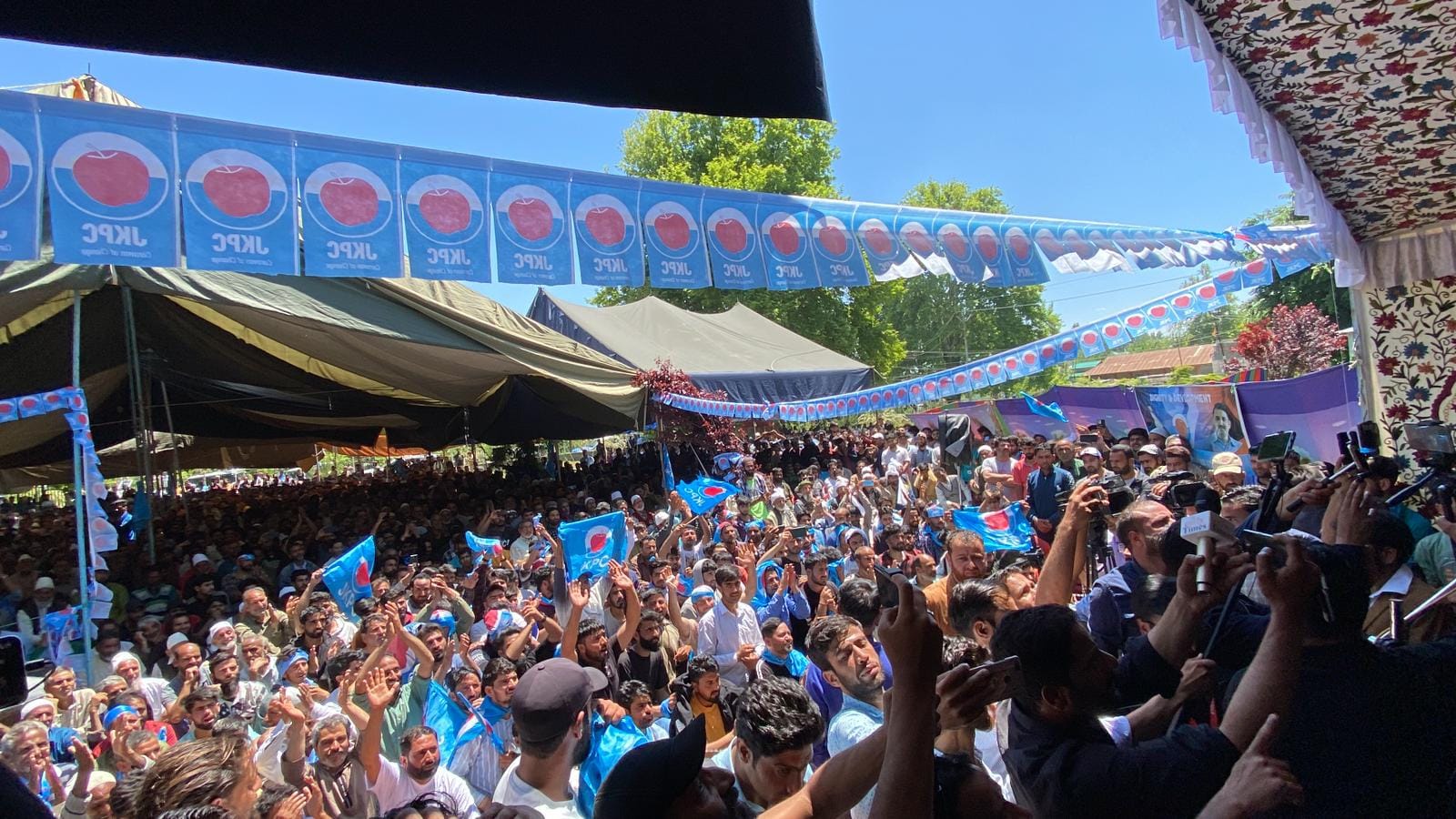
The objective is to ensure a secure and harmonious environment for voters, enabling them to participate in the electoral process without fear.
With polling scheduled for Anantnag-Rajouri on 25, Srinagar on May 13, and Baramulla on May 20, robust security arrangements are in place to safeguard the electoral process and maintain peace in the region.
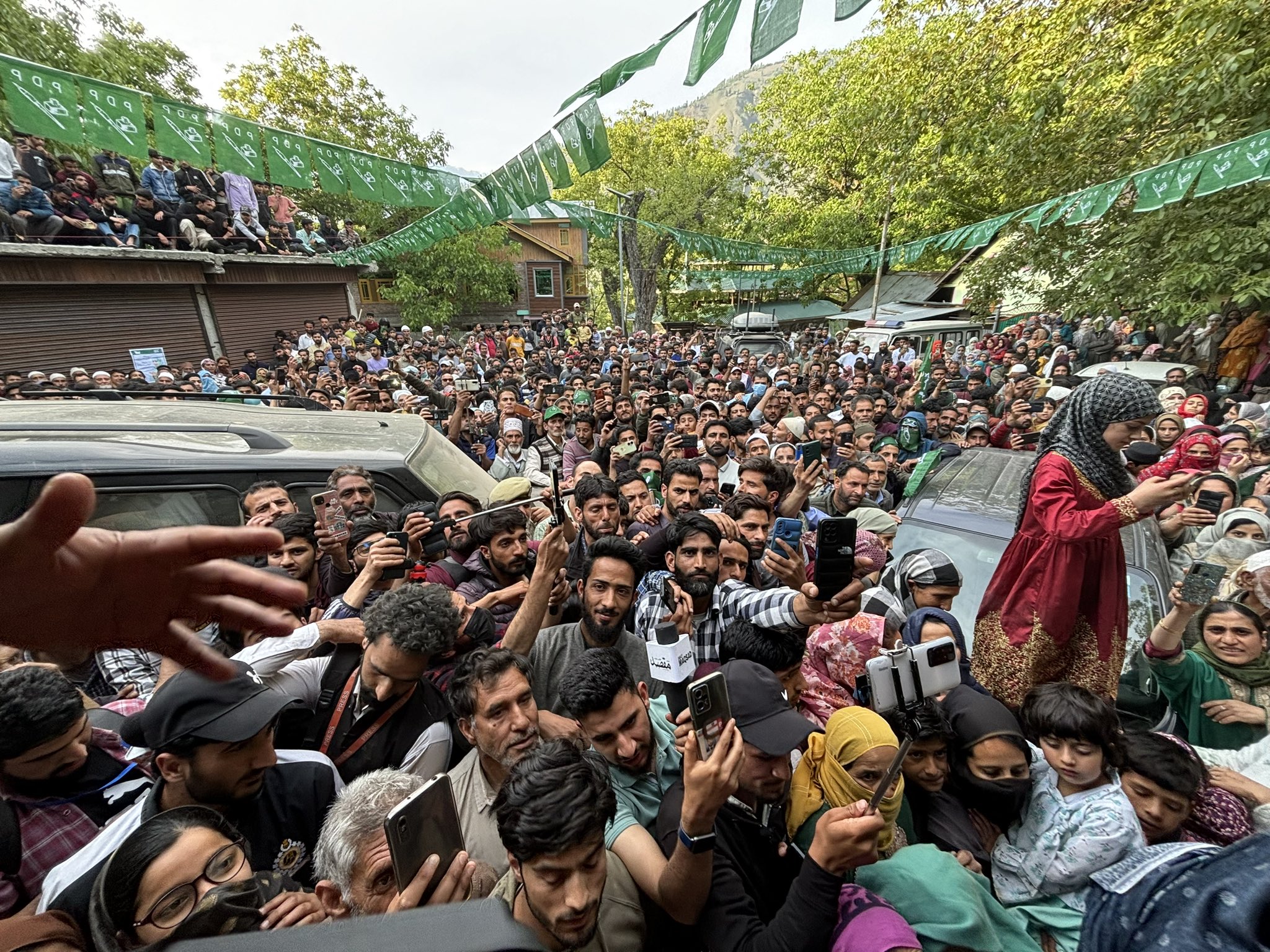
“The security arrangements for polling booths should be put in place efficiently, keeping in view the sensitiveness of the areas. The forces are collectively and strategically working to upholding democratic values and principles, and preserving the sanctity of the electoral process,” Jammu Kashmir Police Director General told the press in April.
Government has also initiated several key initiatives to ensure high voter turnout in the region. One of the many campaigns other than the door to door voter registration is the voter awareness program started SVEEP initiative, which encourages voters to participate in the elections in great numbers.
Saturday marked the last day of election campaign for Srinagar Lok Sabha seat set to go for polls on May 13. The seat is geared for a tight battle between Waheed Parra and National Conference’s Aga Ruhullah Mehdi.
In north Kashmir’s Baramulla seat, Sajad Lone and Omar Abdullah are poised for a tough battle. Jailed Engineer Rashid’s son’s entry into the electoral fray may turn out to be a highlight.
South Kashmir will mark the hardest battle, with former chief minister of the state Mehbooba Mufti and Mian Altaf in the fray for the seat which has recently seen the addition of Rajouri to it.
Marching through the alleys of villages in south Kashmir, Mehbooba Mufti asks people to vote for the “right candidates.” Speaking to The Kashmiriyat in an interview, Mufti said, “This election is not a battle between regional parties, but a battle against the challenge coming from New Delhi. Post August 2019, our resources are being stolen and our rights snatched. Kashmiris have to answer through the ballot.”
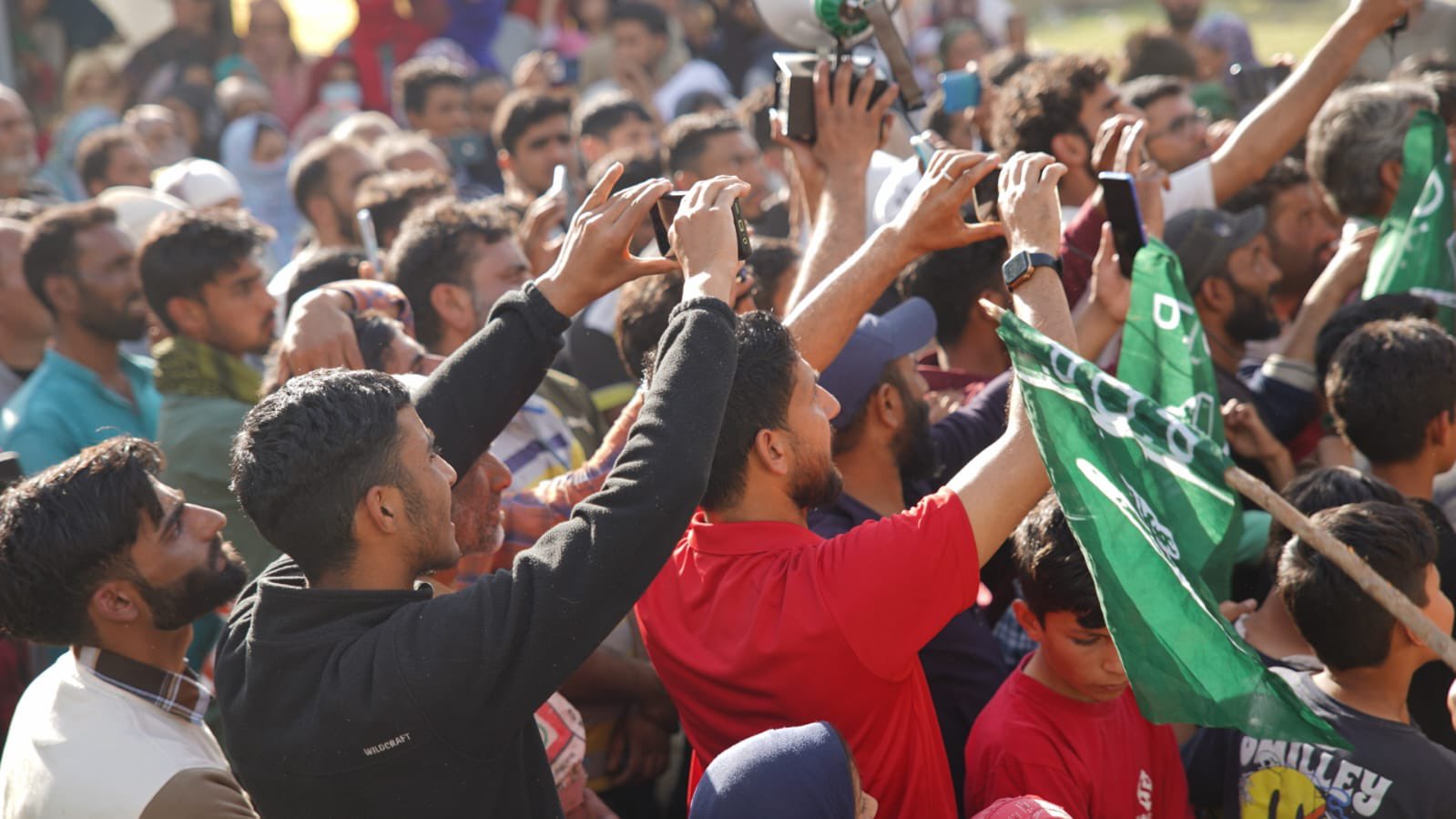
The etnhuasism on the elections is visible in the rallies of political parties in the region. “The elections will provide a platform for disenchanted people to express their sentiments,” Arif said.
“Even many elders from our locality and young Kashmiris, who have never voted before, are eager to caste their ballot to respond to the ruling government and its policies,” said Arif, marking that the ruling party has made allegations against the regional parties.
“We do not have the avenues to express our anger, but through our vote, we will show to them, we are not with a single word they say,” he told The Kashmiriyat.
Regional political parties have successfully organized rallies in areas previously considered separatist strongholds.
Former Chief Ministers Omar Abdullah and Mehbooba Mufti in election rallies in downtown Srinagar signifies a significant shift in Jammu Kashmir’s political landscape. It suggests a growing engagement with the electoral process, marking a potential turning point. Yet, the true impact of this change remains to be fully realized, and only time will reveal its extent.
As fervor grips political rallies, an onlooker’s silence speaks volumes. “There’s no hope,” Aijaz laments, “They’ll abandon us, once the elections end, as they always do,” he declares stoically, returning to his daily grind.




